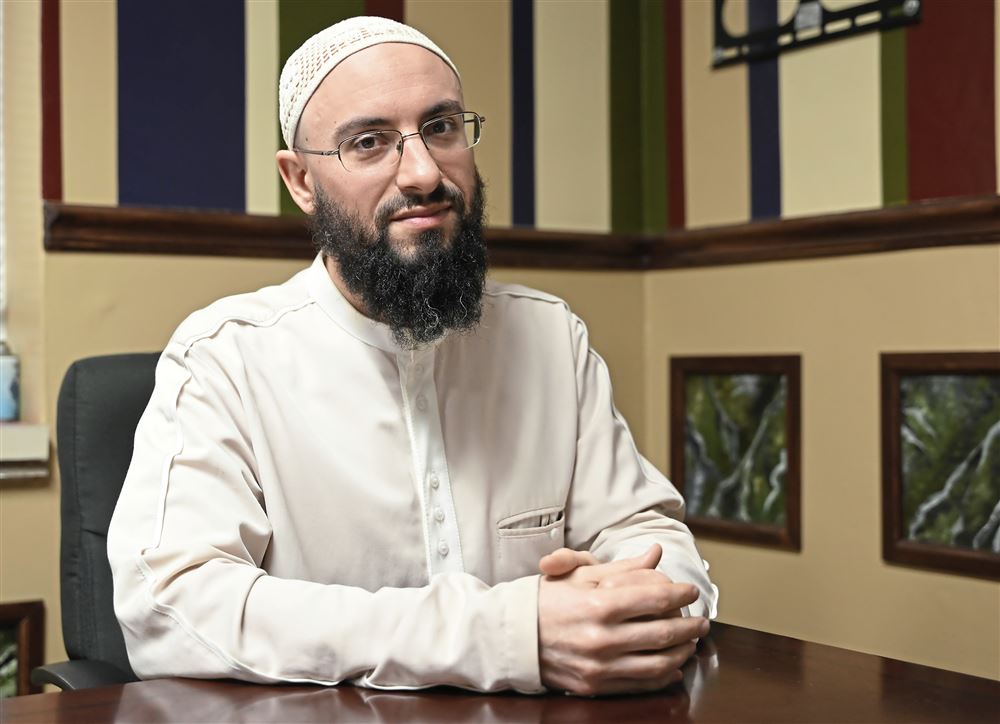‘A divided world’: Religious leaders in Pittsburgh try to unite their houses of worship during contentious election
By Laura Esposito / Pittsburgh Post-Gazette
At noon on Rosh Hashanah, the start of the Jewish New Year, Rabbi Aaron Meyer stood at the pulpit at Temple Emanuel of South Hills and tried to deliver a sermon that would unite the 600 congregants before him.
"For too long, people have been willing to die on their ideological hills without recognizing the hilltop is already littered with bodies of those who have made no difference and died in vain," he told families at the reform Jewish synagogue.
The rabbi said people must matter more than their disagreements, for the sake of the nation and their mental health.
Two weeks later, Rabbi Meyer said he didn’t know whether anyone had listened to what he said that afternoon. The anguish and existential dread running through his congregation has only worsened as November's presidential election edges closer, he said.
"The past year has brought to the surface a number of tensions experienced inter-generationally," he said. "The contention and emotion of the upcoming national election certainly isn't relieving any of those stresses."
Such feelings aren’t unique to the Jewish community. Amid tensions over the Israel-Hamas war, disputes over social issues and often inflamed political rhetoric, religious groups of all types have emerged as key voting blocs making for sometimes uncomfortable moments in the pews.
“This is relatively new in modern American politics,” said Paul Djupe, director of data for political research at Denison University in Ohio and a scholar at the nonprofit Public Religion Research Institute in Washington, D.C. “It is so divided because the rhetoric has become more explicitly religious than it ever has — they really do see the 2024 election as a turning point.”
Nowhere is this more consequential than in Pennsylvania, the most contested swing state, where Vice President Kamala Harris and former President Donald Trump have made direct appeals — and stoked fears — in faith communities across the state, leaving local religious leaders grappling with the aftermath.
Two evangelical movements
Last month, Republican vice presidential candidate JD Vance told Christian voters to "take this country back" during a town hall meeting at the Monroeville Convention Center.
"Unfortunately, our current federal government is trying to destroy [Christian churches and communities], and it's a disgrace," he said at the time. "Let's hope that we can take this country back and make our country better."
The event was hosted by Lance Wallnau, a Dallas evangelical influencer who has called Trump a modern King Cyrus, the ancient emperor of Persia credited in the Bible with freeing Jews from Babylonian captivity.
About an hour before Mr. Vance was scheduled to appear, Pastor Bruce “Buck” Schafer of Grace Life Church in Monroeville and the North Hills told the audience that God had put a divine mandate on Pennsylvania: It would be the determining state in the election.
"I decree that the crooked places in our nation shall be made straight,” he said. “And the crooked places in Philadelphia and Allegheny County and in Washington, D.C., will be made straight."
Religious gatherings have long been a mix of faith and discussions of how to live, and community building moments that bring families together for potlucks, volunteer work and prayer. People have met future spouses at coffee hours and more than a few rock stars trace their musical training to time spent singing in the church choir.
The debate over where politics belongs in religious discussions has been around for a long time, too.
The Rev. Lee Scott, a Presbyterian pastor in Butler and a lifelong Republican, rejects the notion that religious leaders should remain nonpartisan, calling Jesus "fundamentally political." He said he believes the stakes of this election are too high to remain silent.
"I do think that the people who sit in the pews must necessarily be engaged civically in what is happening around them," he said. "It's fundamentally important."
Rev. Scott publicly endorsed Ms. Harris during an Evangelicals for Harris Zoom call on Aug. 14, despite the repercussions he was likely to face within his community, which overwhelmingly supports Trump.
According to AP VoteCast, a sweeping survey of the electorate, about 80% of white evangelical voters cast a ballot for Trump in 2020. This election cycle, evangelicals are twice as likely to plan to vote for the former president than for Ms. Harris, according to Lifeway Research, an evangelical research firm in Brentwood, Tenn.
The language of oppression and persecution used to help energize potential voters worries some observers.
"People have had this sort of apocalyptic worldview for a very long time, and it continually shifts its particular target that it's concerned about — the troubling thing now for those of us in American politics is that it's become really focused on Democrats," Mr. Djupe said.
That kind of language is just one of many reasons that Rev. Scott said he chose to support Ms. Harris. He pointed to Trump's recent musings that "one really violent day" could be a solution to what he has described as a plague of unchecked property crime in American cities.
"That is fundamentally the opposite of what Jesus teaches," Rev. Scott said.
The minister doesn't agree with all of Ms. Harris' views, such as support for abortion rights. But he maintains that she's clear about her beliefs — many of which he does align with, like her support for Israel and Ukraine and her plans that he believes will serve American families, such as expanding Medicaid.
Rev. Scott said he holds no hostility for Trump voters. Recently, he was moved by an old friend from high school who sent him a message on Facebook about his support for Ms. Harris.
“He said, ‘Look, I disagree with you, Trump is the right person for the job. But here's the thing, I really respect the way that you came at this; you have spent time really searching your own faith and searching what it is that you believe and that's influencing how you're evaluating the world around you and I really respect that.’”
The ability to discuss political differences but unify in faith is what Rev. Scott hopes will become more of the norm. He encourages discussions with other evangelical leaders whose views differ from his own.
“The majority of the conversations that I've had with people have been tremendously respectful; it is still possible to disagree [peacefully],” he said.
A united Muslim community
Imam Christopher Caras said there's been little voting tension among Muslims at the Islamic Center of Pittsburgh in Oakland.
Many congregation members are unable to vote due to their immigration status or they choose not to for religious reasons, he said.
Conversations about the upcoming election aren’t frequent at the center, he said. But when the subject surfaces, he said Muslim voters are largely united in thinking that things can't get worse than they already are.
That’s convinced many to choose to abstain from voting or to cast a vote for a third-party candidate.
"The Palestinian people, they're already experiencing a genocide, the worst of it," he said, sitting behind his cluttered desk. "It seems there's a consensus and this will be like the first time in a long time that Muslim voters have been fairly united [in not voting for either major party candidate]," he said.
Imam Caras himself has already cast a mail-in ballot for Green Party candidate Jill Stein.
A survey conducted by Emgage/Muslim Public Affairs Council showed a majority of Muslim voters — 86% — backed President Joe Biden in the 2020 election.
Some Muslim organizations have endorsed Ms. Harris in the 2024 election and have come under fire as a result. On the third night of the Democratic National Convention, the group Muslim Women for Harris released a statement that said it was disbanding because the Harris team had denied a request to have a Palestinian American representative speak on the convention’s main stage.
During his presidency, Trump amped up anti-Islamic rhetoric and signed an executive order banning people from six Muslim-majority countries from entering the United States.
While Muslims have historically made up less than 1% of the Pittsburgh religious landscape, the U.S. Muslim population is projected to grow to 8.1 million, or 2.1% of the nation's total population by 2050. That’s double the number reported in 2018, the most recent data publicly available.
Imam Caras said American Muslims are ready to make sacrifices to send a strong message to Washington — don't take us for granted.
"We will no longer be swayed and coddled by empty words, gestures, photo ops, and handshakes," he said. "We want real policy when you can do it, which is right now, not after the election, not empty promises."
Divided Jewish voters
The Keystone state counts 430,000 Jewish residents, the most of any swing state, according to the American Jewish Year Book. Four years ago, more than two-thirds of Jewish voters supported Mr. Biden over Trump, backing him by 69% to 30%, according to AP VoteCast.
The Hamas attack against Israel a year ago shook Pittsburgh's Jewish community while it was still reeling from the 2018 Tree of Life synagogue shooting, which killed 11 people and remains the deadliest antisemitic act on American soil.
Rabbi Meyer, 42, said Jewish voters are feeling "very vulnerable" due to a slew of antisemitic incidents and campus protests against Israel’s war in Gaza that became hotbeds for disagreement and demonstrations in the Pittsburgh region and beyond.
Within the Jewish community, different views on politics can be heard, including from those who are outspoken — and outraged — over Israel’s war in Gaza.
At Temple Emanuel, Rabbi Meyer said differing beliefs often break down over traditional lines such as economic status, upbringing and world views.
"In previous election cycles, members of the Jewish community were more willing to overlook public policy or foreign policy disagreements with a shared portfolio of interest that could be accomplished together," Rabbi Meyer said.
Now, that's not as much case, partly due to younger Jewish voters shifting toward more extreme views — both Democratic and Republican — that sets them at odds with their more moderate older family members, Rabbi Meyer said.
Some also worry about what happens after the election. "The Jewish community, like others, fears the repercussions of scapegoating in a time of increased violent rhetoric and potential for physical violence," Rabbi Meyer said.
Rabbi Meyer said he aims to quell tensions and anxieties, and encourages his congregation to vote with Jewish values in mind.
He isn’t always able to navigate the differing opinions within the congregation; in fact, Rabbi Meyer said he’s at times faced scrutiny from community members who feel he’s stepped “over the line” with his own views.
As a religious leader, he said he finds it rare that talking about politics in “such a divided world” yields any benefits. He prefers not to publicly disclose whom he will vote for as he believes it would further divide his community.
"I hope that whoever wins that we are able to do the work of bridging the divide in not only the country, but Allegheny County and the communities within it," he said.

